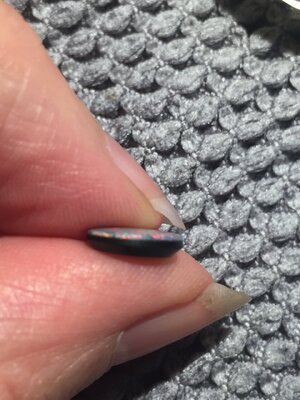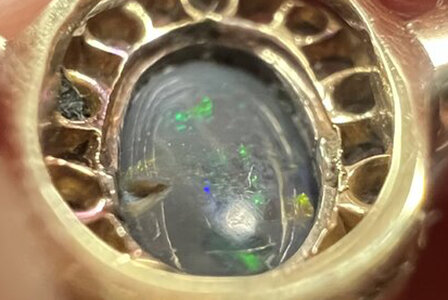- Joined
- Oct 23, 2011
- Messages
- 7,212
Do you have a photo of the opal from the side? and its back?
And do you happen to have an image of the opal before it was set?
Oooo she sure is pretty. Yeah, it's fairly impossible to tell from this photo whether the stone is backed and/or capped. So the seller is saying solid boulder?
What does backed or capped mean?
The seller is saying boulder and has it priced at 1600 but is having a half off sale.

I'm not an opal expert but...
It doesn't jump out to me as obviously synthetic.
The usual way to spot a doublet is to look at the sides - the join between the stone and the backing is usually clean and straight. See @Bron357's example.
But here's the catch. With a bezelled stone this would require unsetting the stone, destroying the bezel in the process. The vendor probably won't want to do that. Maybe the vendor has a report or a picture of the unset stone? If not, it's an impasse.
Note also that doublets can be made with ironstone backing (not just potch, as Bron357 described). A seller trying to misrepresent such a doublet would have to describe it as boulder opal, because the ironstone back would be visible.
In your position, I wouldn't take the chance, unless the seller could give some positive evidence.
But that amounts to saying that I would never buy a bezelled opal, except from a trusted seller. So I'd miss out on a genuine solid opal from a legitimate seller... And what's an honest seller of such an opal to do? I don't know...
Hi. An ironstone backing could still be a doublet, if I am understanding correctly?
Yes. That's the problem. A natural boulder opal would (of course) have an ironstone back, but so would a doublet made with an ironstone backing. Unless you can see the edge, it's very hard to tell the difference.
A possible clue is that the colour layer in boulder opals is often thin and irregular, with 'dents' and bends. (You can see these by looking at the surface reflections.) So a high, smoothly curved dome would raise suspicions. But it's not conclusive either way.
Boulder opal is solid opal on ironstone. If you can see the back of the gem then it’s relatively easy to tell.
A doublet is a thin piece of opal on a backing - usually potch. A doublet is usually flat topped or only very slightly domed. You need a side on view to see for certain.
A triplet is an even thinner sliver of opal onto a backing with a cap on top. This cap will be domed. Cheap opals it’s plastic, better quality triplets have crystal or even lab white sapphire. A triplet can be beautiful looking and in a ring with a lab sapphire top, very hard wearing, unlike natural opal which is low on MoHos.
This is a side view of a doublet.


I'm confused!
The back is not what I expected to see:
A typical boulder opal back is red-brown-black, grainy and opaque. See this video from Black Opal Direct at about 0:8 to 0:10 seconds. The back of your stone looks more like darkish potch (if the grey colour in the picture is accurate).
That would make your stone a 'dark' opal (not a boulder opal), if it's solid. But: (a) The potch backs I've seen have been plain grey, sometimes with a bit of sand. I haven't seen them with coloured flecks, as in yours. So I just don't know whether this is a sign of anything amiss. (b) It could still be a doublet - without seeing the edge, it's hard to tell.
So it seems your stone could be a solid dark opal (which is good), or it could be a doublet (which is not so good). I'm leaning towards solid. But, as you can tell, I'm out of my depth, so I wouldn't want to mislead you. You need an actual expert. I'm sorry I can't be more help.
Does color play mean color shift? Bc I swear I keep seeing colors change!Color play on the back makes me think solid opal. It’s rarer to see on the back, but that’s good for the OP
Does color play mean color shift? Bc I swear I keep seeing colors change!
Color play on the back makes me think solid opal. It’s rarer to see on the back, but that’s good for the OP
Wow! I am so excited. I did purchase it and have 30 days exchange window. So far I am loving her! Ty all!
A video showing how the colors and pattern changes from front to back is the best way to judge an Opal's authenticity online.
If the colors stay the same and there is no movement in pattern that most likely suggest a lab Opal.
But you did a good job with the pictures. I would say it is natural.
Seems like there are no more synthetic gemstones since synthetic diamonds got rebranded?
Seems like there are no more synthetic gemstones since synthetic diamonds got rebranded?